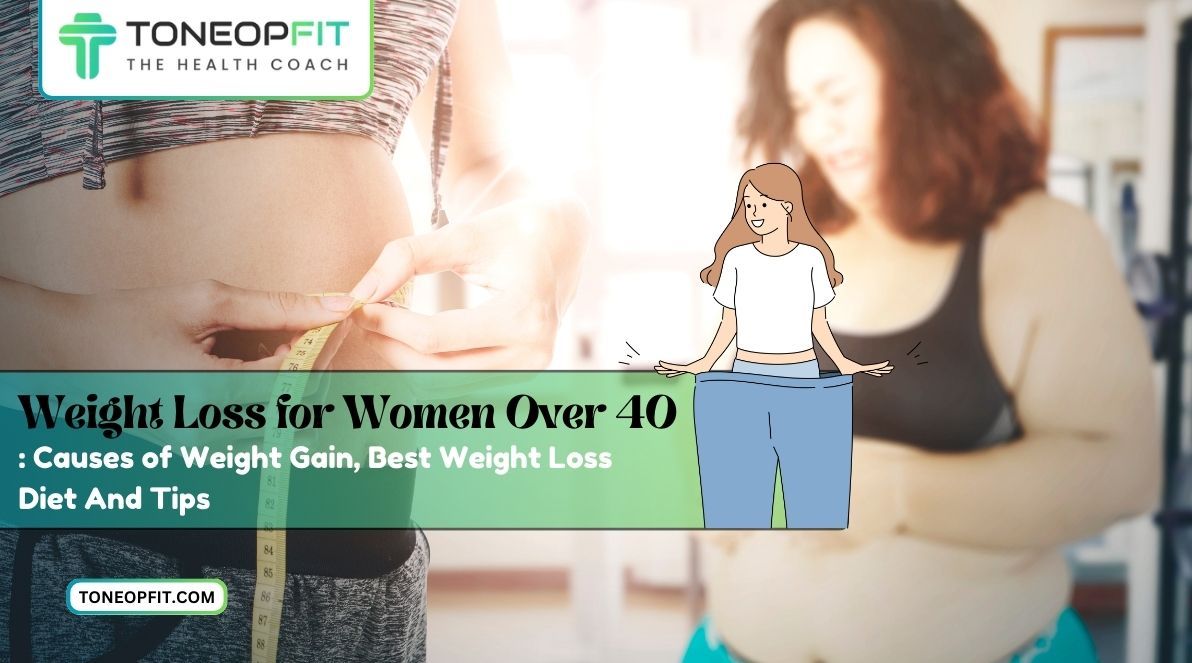Weight gain is normal as we age, especially for women, and losing that weight after age 40 can be particularly difficult, considering metabolic and lifestyle changes and other factors. After they turn 40, women’s estrogen levels decline during perimenopause, their metabolism slows down, and they lose their muscle mass, making it even harder for them to lose weight.
However, weight loss for women in their 40s is neither impossible nor difficult. Are you in the same boat as so many others? Lucky for you, we have compiled everything you need to know about weight gain after 40 and how best to lose it and keep it at bay!
Table Of Contents
- Why It's Difficult to Lose Weight After 40?
- How To Lose Hormonal Belly Fat After 40?
- What Is The Best Diet For Women Over 40 To Lose Belly Fat?
- Dietitian’s Recommendation
- The Final Say
- FAQs
- References
Why It's Difficult to Lose Weight After 40?

Weight gain is common in both men and women as we age. For women, weight loss goals after midlife can be more challenging due to hormonal changes after menopause, loss of muscle mass, and other factors that can interfere with healthy habits for good health.
Weight gain is not directly caused by menopause, but it does decrease estrogen levels, which can increase fat storage, especially around the abdomen.
Let’s delve deeper into why it’s difficult to lose weight after 40:
1. Metabolic Changes
Weight loss and metabolism are closely linked. Metabolism is the process by which your body gets energy from food. Changes in this process can affect how easily you gain or lose weight. Women, in particular, metabolise food differently as they age.
Men tend to have higher blood sugar levels after meals than women in their early years, but this changes and reverses with age. Women usually have higher blood sugar levels after meals, which may be why they are more likely to gain weight after age 40. However, these changes vary from person to person and depend on how well your body can digest foods containing carbohydrates.
Also Read: Get In Shape With This Simple & Effective Weekly Workout Plan For Weight Loss
2. Muscle Mass Loss
Muscle mass naturally decreases as you age, slowing your metabolism. As a result, your body uses fewer calories while at rest, which means you gain weight on the same diet, and if you eat less, it will be harder to lose weight. A number of lifestyle factors might contribute to muscle loss, including lack of exercise, dietary factors, chronic illness, and genetics.
As we age, hormonal changes also play a role in muscle loss. For women, a decrease in estrogen levels during menopause can contribute to a reduction in muscle mass, further complicating weight management. Additionally, inadequate protein intake can hinder muscle preservation and growth.
Also Read: Fat Mass Vs. Muscle Mass: Meaning, Comparison And Ratio
3. Menopause And Perimenopause
Menopause and the phase before it, perimenopause, involve a variety of hormonal changes. Many women gain an average of 2.5kg after menopause, according to the Department of Women's and Children's Health. As a result, your body composition and body's fat storage can also change. Menopause lowers the amount of estrogen in a woman's body, and these lower estrogen levels can play a role in postmenopausal weight gain.
Estrogen helps regulate hunger, body weight, glucose, metabolism, and insulin sensitivity, and lower levels of estrogen tend to increase belly fat. Therefore, in women in their 40s, a decrease in estrogen and progesterone production can contribute to weight gain during perimenopause or menopause. It can also be caused by lifestyle changes brought on by the hormonal changes during perimenopause and menopause.
4. Lifestyle Factors
It is important to remember that changes related to hormones, metabolism, and muscle mass affect each person differently. However, we generally tend to be less active as we age, which leads to fewer calories burned and causes weight gain.
Additionally, our diet and eating habits change over time, often influenced by lifestyle shifts, health concerns, or emotional factors.
5. Stress
Stress is common among adults who are juggling careers and family responsibilities, and it can affect weight and overall health. Stress triggers cortisol release, a hormone that activates the body’s fight-or-flight response. However, since most of our stressful situations aren’t life-threatening, this excess cortisol often remains unused, leading to fat storage in the body. This process can contribute to weight gain, especially around the abdominal area.
Also Read: 5 Stress Relief Workouts And 7 Ways To Unwind For A Balanced Life
6. Sleep
Another important factor for weight after 40 is lack of sleep. Hormonal changes in women can make it difficult to sleep at night. Nearly 35-60% of postmenopausal women have problems sleeping, according to research on menopause studies by a National Institutes of Health expert panel. Low progesterone levels make it harder to fall asleep and stay asleep and cause hot flashes or night sweats. Continuous periods of less than 6 hours have been shown to lower the immune system, slow metabolism and increase appetite, all of which have a negative impact on the body.
How To Lose Hormonal Belly Fat After 40?
You can lose hormonal belly fat and weight after 40’s by doing the following th:
1. Exercise
Engage in regular moderate-intensity physical activity for at least 30 minutes a day to support weight control, including strength training exercises. Adding a mix of aerobic exercises, like brisk walking or cycling, along with strength training, will support you to build lean muscle mass, boost metabolism, and improve overall fitness. Aim for a balanced routine that includes balance and flexibility exercises to enhance your physical capabilities and reduce the risk of injury.
2. Increase Your Lean Protein Foods
A US study published in the Nutrition Metabolism Journal in 2012 showed that a high-quality protein diet may be associated with reduced belly fat. The study lists the world's healthiest foods as quality protein sources, including tuna, cod, chicken, turkey, soybeans, and salmon. Other rich protein and nutritious foods are eggs, nuts, and beans.
Also Read: Protein Powder For Non-Gym Goers: 5 Types, Benefits, Myths And Ways To Include In Diet!
3. Don't Skip Meals
When you skip a meal, your body responds by increasing your cortisol levels, appetite, and fat storage, especially around your belly. This response makes it more challenging to maintain a healthy weight. To counteract this, eating small, balanced meals and snacks throughout the day can help manage cravings and stabilise blood sugar levels.
4. Take Vitamin D Supplements
Eat foods rich in calcium, such as kale, chia seeds, or dairy products and take a vitamin D supplement. A study published in the Journal of Nutrition found that calcium and vitamin D3 supplementation over 12 weeks significantly reduced body fat and abdominal fat in individuals with deficient calcium intake. This suggests that adequate Vitamin D levels can support weight management and enhance fat loss efforts.
5. Eat Foods With Probiotics
Eat foods with probiotics, especially fermented milk. A 2010 study published in the European Journal of Clinical Nutrition showed that probiotics reduce abdominal adiposity, which is the accumulation of fat around the stomach and abdominal area. Kefir is a current trending probiotic food that can be added to milk, water, smoothies, and more.
6. Relax
Your cortisol levels increase when you are under stress. Tight deadlines at work, financial difficulties, injuries, or illnesses can all cause chronic stress, which can cause your cortisol levels to rise to extremely high levels and even totally interfere with your adrenal system's ability to function. Increased inflammation, weakened immunity, and weight gain or failure to shed weight can result from this.
7. Get A Good Night's Sleep
Sleep is essential for weight management. Too little or poor quality sleep leads to weight gain, unhealthy food cravings, and an increased risk of heart disease and diabetes. Without sufficient sleep, you’re more likely to be tired, and when you're tired, you produce more ghrelin, which creates cravings for sugar and other fat-building foods. Sleep loss can also alter hormone production and adversely affect cortisol levels, causing an increase in weight.
Also Read: Struggling With Sleepless Nights? Try These 7 Best Yoga for Better Sleep
What Is The Best Diet For Women Over 40 To Lose Belly Fat?
Weight gain is common as we get older, but finding the best diet for weight loss can be a strategy to help improve nutrition, health, and quality of life in your 40s.
The best diet for women over 40 to lose weight and belly fat are:
1. Eat More Vegetables
Focus on a variety of colours in your vegetables, from dark leafy greens to red peppers to orange carrots. Starchy vegetables, like beans, peas, sweet potatoes, and lentils, are good, too. You should also focus on adding more weight loss fibre foods as they will help you feel full without overeating and strengthen you during your workout.
2. Switch To Whole Grains
You don't have to cut out carbohydrates to lose weight in your 40s. Carbs are essential for overall health, energy and wellness, especially whole grains. Instead of cutting out carbs entirely, choose whole grains like rye, barley, and quinoa for optimal nutrition. Choosing complex carbohydrates over simple carbs can give you energy for exercise, plus essential nutrients and fibre.
3. Eat Healthy Fats
Replace saturated and trans fats with polyunsaturated fats. Healthy fats like salmon, avocado, walnuts, and extra virgin olive oil can improve satiety. However, you still need to maintain a moderate healthy fat intake as it comes with loaded calories.
You may also need to take a fish oil supplement, but check with your dietitian or doctor about the amount and ensure it's safe for you.
Try ToneOp’s Fish Oil Capsules for blood pressure, skin ageing, weight loss and bone density.
4. Add More Protein
Incorporating healthy protein into your diet will be critical as you turn 40. Protein helps build muscle and increases satiety, which can help reduce belly fat and help weight loss.
Lean protein helps with weight loss because it helps the body burn calories and increases satiety. Healthier protein sources include lean meat, poultry, fish, eggs, dairy products, legumes and nuts. Focus on lean meats over red and processed meats like ham, bacon, and mutton, as they come with higher levels of fats. You should also include poultry, seafood, tofu, and eggs.
Try ToneOp Care’s Alfalfa Powder, which is a vegan protein superfood that is used for muscle building and weight loss.
6. Add More Calcium
Bone health is essential for middle-aged women. Getting enough calcium is a cure for potential problems like osteoporosis. Low-fat cottage cheese, Greek yoghurt, and low-fat milk are all great options for calcium without too much fat and calories. Additionally, you can also take calcium supplements such as Bone 360 tablets by ToneOp Care.
7. Drink Lots Of Water
If you’re trying to lose weight, you may have heard that drinking more water can help. Staying hydrated not only keeps you feeling full but also supports weight loss, especially after 40. Aim for at least 2-3 litres of water a day.
8. Eat Iron-Rich Foods
Your body needs iron to produce red blood cells, which are essential for delivering oxygen to muscles and enabling them to burn fat efficiently. To boost your iron intake and support weight loss, incorporate lean meats, beans, and spinach into your diet. Additionally, pairing these iron-rich foods with vitamin C sources can enhance iron absorption, further optimising your body's fat-burning potential.
9. Get Vitamin D
Vitamin D deficiency is commonly associated with metabolic diseases and lipid dysregulation, such as diabetes and metabolic syndrome. Getting sufficient vitamin D can improve insulin sensitivity, boost metabolism, and reduce fat storage production, which can all help in weight loss. You can get vitamin D by sunbathing, eating oily fish, and taking supplements.
Dietitian’s Recommendation
As you age and gain weight, it's important to set realistic, sustainable goals for your body and move forward with forgiveness, making room for sleep and exercise in your routine. Finding fun ways to exercise and eat a healthy and varied diet is essential to maintaining a healthy weight. Forget counting calories and focus on including a variety of plant-based foods in your diet. Time-restricted eating can also help.
Dt. Lavina Chauhan
The Final Say
In conclusion, losing weight for women over 40 can be challenging due to hormonal changes and lifestyle factors. However, by adopting effective strategies such as increasing protein intake, engaging in strength training, and focusing on whole foods, women can achieve their weight loss goals. It's also essential to prioritise sleep and manage stress to support metabolism. By making these lifestyle changes, women can not only shed pounds but also enhance their overall health and well-being.
FAQs
1. Can a 40-year-old woman lose belly fat?
Yes, a 40-year-old woman can lose belly fat through aerobic strength training, point exercises like sit-ups, etc., and a healthy diet.
2. What should a 40-year-old woman eat to lose belly fat?
Eat plant-based foods like fruits, vegetables, and whole grains. Limit your protein to lean protein sources such as fish and low-fat dairy products. Avoid processed meat, red meat, and high-fat dairy products such as cheese and butter.
3. How can I effectively shed pounds after 40 while maintaining my energy levels?
Focus on eating a balanced diet full of fruits, vegetables, and protein to lose weight after 40 while maintaining your energy levels. You should also regularly engage in strength exercises to gain muscle. Maintaining energy levels throughout your weight loss journey also depends on drinking enough water and obtaining adequate sleep.
4. What are the best strategies for weight loss after 40 for females looking to stay healthy?
The best strategies include eating more protein, engaging in regular physical activity, managing stress, and prioritising sleep. These habits help create a sustainable weight loss plan while promoting overall health.
5. What are some effective fat loss tips for women over 40 that can help with metabolism?
Follow these tips for weight loss for women over 40:
- Do strength training
- Increase protein intake
- Stay hydrated
- Get enough sleep
- Manage stress
References
- https://www.poise.com/en-ca/advice-and-support/fitness-nutrition/fighting-abdominal-fat-after-40
- https://midsouthbariatrics.com/healthy-diet-for-women-over-40/
- https://www.franciscanhealth.org/community/blog/why-is-it-harder-for-women-to-lose-weight-after-40
- https://www.topnutritioncoaching.com/blog/best-diet-for-women-over-40
- https://zoe.com/learn/losing-weight-after-40
- https://www.forhers.com/blog/losing-weight-after-40
About ToneOp Fit
ToneOp Fit is a platform dedicated to improving and maintaining good health through a comprehensive range of goal-oriented health plans with up to 3 Coach support. With a range of Weight Management, Medical Condition, Detox Plans, and Face Yoga Plans, the app also provides premium health trackers, recipes and health content. Get customised diet, fitness, naturopathy & yoga plans and transform yourself with ToneOp.















